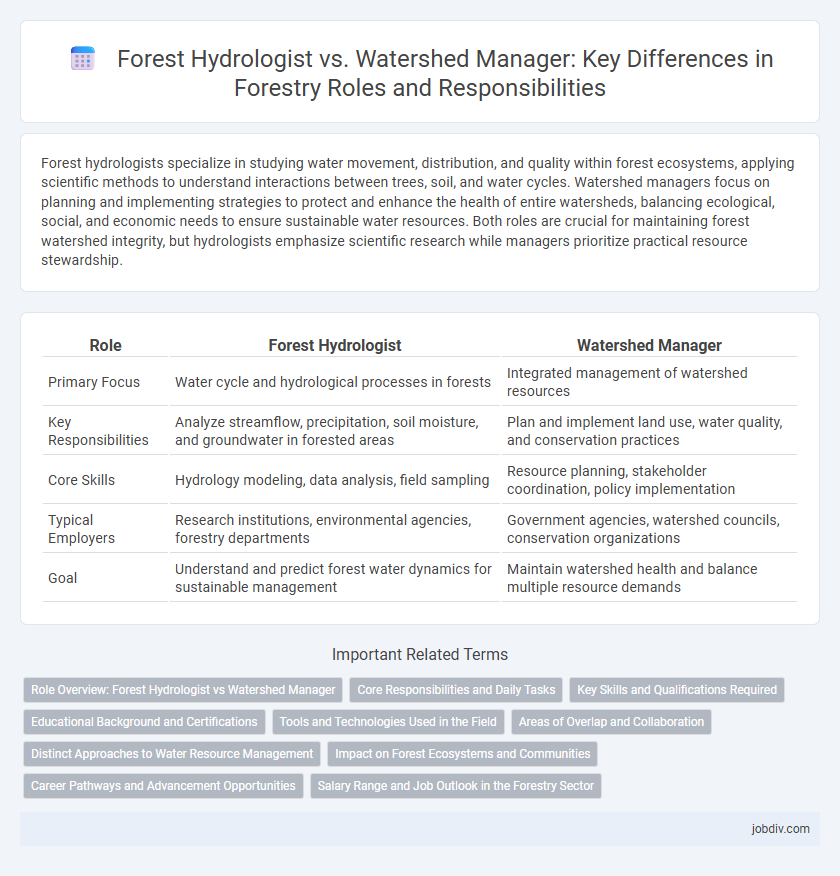Forest hydrologists specialize in studying water movement, distribution, and quality within forest ecosystems, applying scientific methods to understand interactions between trees, soil, and water cycles. Watershed managers focus on planning and implementing strategies to protect and enhance the health of entire watersheds, balancing ecological, social, and economic needs to ensure sustainable water resources. Both roles are crucial for maintaining forest watershed integrity, but hydrologists emphasize scientific research while managers prioritize practical resource stewardship.
Table of Comparison
| Role | Forest Hydrologist | Watershed Manager |
|---|---|---|
| Primary Focus | Water cycle and hydrological processes in forests | Integrated management of watershed resources |
| Key Responsibilities | Analyze streamflow, precipitation, soil moisture, and groundwater in forested areas | Plan and implement land use, water quality, and conservation practices |
| Core Skills | Hydrology modeling, data analysis, field sampling | Resource planning, stakeholder coordination, policy implementation |
| Typical Employers | Research institutions, environmental agencies, forestry departments | Government agencies, watershed councils, conservation organizations |
| Goal | Understand and predict forest water dynamics for sustainable management | Maintain watershed health and balance multiple resource demands |
Role Overview: Forest Hydrologist vs Watershed Manager
Forest hydrologists specialize in studying and managing the interactions between forests and the water cycle, focusing on water quality, flow, and distribution within forested ecosystems. Watershed managers oversee the integrated management of entire watersheds, coordinating land use, water resources, and ecological health to ensure sustainable water supply and mitigate flood risks. Both roles require deep knowledge of hydrology and ecology but differ in scale and scope, with forest hydrologists concentrating on forest-specific water processes and watershed managers addressing broader watershed-scale challenges.
Core Responsibilities and Daily Tasks
Forest hydrologists analyze the movement, distribution, and quality of water within forest ecosystems, conducting field measurements and modeling to assess streamflow, soil moisture, and groundwater interactions. Watershed managers focus on planning and implementing strategies to protect and restore watershed health, coordinating land use practices, erosion control, and stakeholder engagement to maintain water resources. Both roles require monitoring water cycles and collaborating with environmental agencies, but forest hydrologists emphasize scientific data collection while watershed managers prioritize management and policy execution.
Key Skills and Qualifications Required
Forest hydrologists require expertise in hydrological modeling, water cycle analysis, and soil-water interactions, often holding degrees in hydrology, environmental science, or forestry. Watershed managers must excel in ecosystem management, land-use planning, and stakeholder coordination, typically possessing qualifications in environmental management, civil engineering, or natural resource management. Both roles demand proficiency in GIS technology, data interpretation, and regulatory compliance to effectively manage water resources and sustain forest ecosystems.
Educational Background and Certifications
Forest hydrologists typically hold advanced degrees in hydrology, environmental science, or forestry with specialized training in water cycle analysis and watershed processes. Watershed managers often possess backgrounds in natural resource management, environmental engineering, or forestry, complemented by certifications such as Certified Watershed Professional (CWP) or Project Management Professional (PMP). Both roles may require continuing education in GIS technology, soil science, and state-specific environmental regulations to maintain expertise and certifications.
Tools and Technologies Used in the Field
Forest hydrologists utilize advanced remote sensing technologies, GIS (Geographic Information Systems), and hydrological modeling software like SWAT (Soil and Water Assessment Tool) to analyze water flow, soil moisture, and precipitation patterns in forest ecosystems. Watershed managers rely on these tools as well but focus more on integrated watershed management platforms, drone-based aerial surveys, and real-time water quality monitoring sensors to implement conservation practices and manage watershed health. Both professions leverage data analytics and satellite imaging to inform sustainable water resource management and forest conservation strategies.
Areas of Overlap and Collaboration
Forest hydrologists and watershed managers share expertise in analyzing water flow dynamics within forested landscapes, crucial for sustainable water resource management. Both professionals collaborate on watershed restoration projects, employing hydrological models and data to improve water quality and mitigate erosion. Their joint efforts integrate ecological principles with land-use planning to balance forest health and watershed functionality effectively.
Distinct Approaches to Water Resource Management
Forest hydrologists specialize in analyzing water cycles within forest ecosystems, focusing on processes such as infiltration, evapotranspiration, and streamflow dynamics to maintain ecological balance. Watershed managers adopt a broader perspective, integrating land use planning, infrastructure management, and community engagement to sustain water quality and quantity across entire watershed regions. Both roles apply distinct methodologies but share a common goal of optimizing water resource management through science-based decision-making.
Impact on Forest Ecosystems and Communities
Forest hydrologists analyze water flow, quality, and distribution within forest ecosystems, directly influencing forest health and biodiversity by managing factors like soil moisture and streamflow patterns. Watershed managers implement policies and practices that protect water resources and reduce erosion across entire drainage basins, ensuring sustainable water supply and mitigating flood risks for surrounding communities. Both roles are critical in balancing ecological integrity with community needs, promoting resilient forest-water systems under changing environmental conditions.
Career Pathways and Advancement Opportunities
Forest hydrologists specialize in studying water movement within forest ecosystems, focusing on research, data analysis, and environmental impact assessments, often advancing to senior scientist or academic roles. Watershed managers concentrate on overseeing land and water resources, implementing management plans, and coordinating with stakeholders, progressing toward leadership positions in government agencies or environmental consulting firms. Both careers offer growth through specialization, policy influence, and integrated resource management expertise.
Salary Range and Job Outlook in the Forestry Sector
Forest hydrologists typically earn between $55,000 and $90,000 annually, with job opportunities driven by increasing demands for sustainable water resource management in forested areas. Watershed managers often command salaries ranging from $60,000 to $95,000, benefiting from expanding roles in ecosystem restoration and climate resilience initiatives. Both careers show positive job growth projections, reflecting heightened awareness of integrated water and forest conservation practices in the forestry sector.
Forest Hydrologist vs Watershed Manager Infographic

 jobdiv.com
jobdiv.com